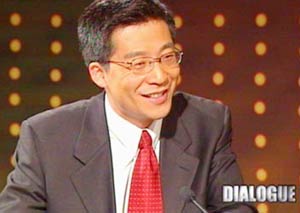Source: CCTV.com
12-31-2005 13:55

Yang Rui is a producer and regular presenter of CCTV9's current affairs discussion programme 'Dialogue' and a keen advocate for the new channel. He is acutely aware of the role that CCTV-9 plays as a link between China and the potentially vast global audience. Moreover, his optimism for the future and his faith in the channel's product is typical of many of those involved in the station.
Yang began his journalistic career over thirteen years ago. After graduating with his first degree, he was accepted to join an International Journalism degree course at the Shanghai Foreign Languages Institute. This was a pioneering course whose intention was to train English speakers to become foreign correspondents stationed around the world. Yang was part of the first of only two batches of graduates and the course was soon aborted. In its short time, however, the course had managed to produce a group of highly trained English language broadcasters. Many of them took their skills abroad, mostly to the US, while others such as Yang remained here, working for the National Radio Service before joining CCTV in 1988.
CCTV-9 itself grew out of the English Transmission Channel, a semi-official piece of programming which existed for two years from 1999. Apart from this, the only available English programmes were the sporadic news items shown on CCTV-2. The new channel, part of the CCTV network, was a bold move into a new market. Although still in its infancy in terms of content and quality, it is growing at pace and is beginning to establish its role and identity-particularly in terms of communicating the Chinese perspective on news issues.
"Sure, CCTV-9 functions in some respects to help polish China's image" says Yang, "This is because in their reporting on China, foreign correspondents tend to dwell on the negative points. What we want to present is a mature outlook." As such, the channel concentrates mainly on news and information. Its flagship news programme 'World Wide Watch' is shown daily at 7 pm. Other programs include Center Stage, China Business Guide, Around China and of course Dialogue.
Dialogue is broadcast every Tuesday, Wednesday, Thursday and Saturday at 6.30 pm on CCTV-4 and further repeated at various times during the week on CCTV-9. Its aim is to provide serious and open discussions on a wide range of current issues. Having spent a year in the UK earlier in his career, Yang is well aware of the ways that the media of other countries attempt to treat news and current affairs. The fact that his favourite broadcaster is the British presenter and journalist Jeremy Paxman further indicates the way he likes to operate.
"We try to present serious topics in an interesting way." he says. "The advantage of our format is that we give our guests room for in-depth dicussion - to really explore the background of issues and to get the stories behind major events. We ask for dialogue not confrontation, a sentiment we would like to think, could be reflected in other areas of international life."
Although CCTV pictures are available in theory to 98% of the globe, the audience is currently a fraction of what the CCTV9 visionaries would like to see. The service is still not yet even widely available in China itself, being transmitted only through certain cable feeders. Yang agrees: "Of course it is difficult for us to compete with the global and local networks. We tend to attract a more specialized audience, those who would search out the service. It is for example available to the US congress through C-Span, which can only help facilitate exchange. At the moment though our audience is divided into three groups: native speakers home and abroad which may include tourists, politicians or dedicated China-watchers; those who use English as a working language such as diplomats and businessmen; and finally those Chinese who study English, estimated at around 100 million potentially."
As yet, much of the talk at CCTV-9 is of potentials. Yang and his contemporaries hope for a future when the channel can become the Chinese version of CNN. Already the broadcaster has established twenty or so news bureaus abroad and has started to send correspondents overseas to cover major news stories. Obviously, all this will take an investment of money and talent and the station will have to seriously raise its game if it hopes to compete with the likes of CNN. But as Yang often mentions, this is the time for optimism and progress and the very fact that China already has a rolling news and information service in English is something to be extremely proud of.
From Beijing Journal, July 2001
Editor:Chen Zhuo
